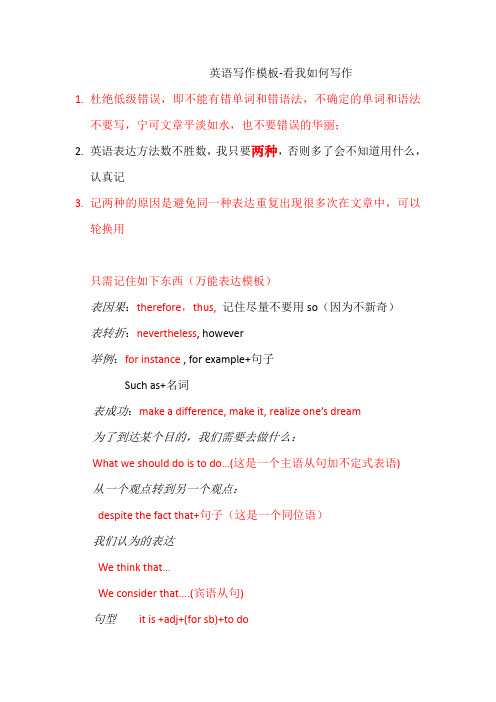英文写作终极指南:简洁才是王道
风格总结英文

风格总结英文一、概述在英语写作中,掌握合适的风格非常重要。
一个清晰、简洁、准确的表达方式可以帮助读者更好地理解和接受我们的观点。
本文将总结一些常见的英文写作风格,并提供一些建议,以帮助读者提高其英语写作能力。
二、正式风格在正式场合,如学术论文、商务信函等,正式风格是首选。
具体特点如下:1. 使用完整的句子结构在正式场合,我们应该避免使用片段或不完整的句子结构,而要使用完整的主谓宾结构。
这有助于使我们的思想更加清晰,同时也符合语法规则。
2. 避免使用口语化词汇为了保持正式风格,我们应该尽量避免使用过于口语化的词汇。
替代品可以是更正式的同义词或专业术语。
例如,我们可以使用“determine”代替“find out”,使用“issue”代替“problem”。
3. 借助长句和复杂句在正式写作中,长句和复杂句可以帮助我们更好地组织思想并表达复杂的观点。
然而,我们也应该注意保持句子的连贯性和易读性,避免过度冗长或晦涩难懂的句子。
三、简洁风格简洁的英语写作风格有助于提高读者的阅读体验,并能更好地传达我们的观点。
以下是几个简洁风格的要点:1. 使用简短的句子和段落简短的句子和段落易于阅读和理解。
我们应该尽量避免过长的句子和段落,以免读者迷失在复杂的句子结构中。
2. 删除多余的词汇和修饰语在写作过程中,我们应该审查并删除多余的词汇和修饰语,使句子更加简洁明了。
例如,我们可以将“in order to”替换为“to”,将“at the present time”替换为“now”。
3. 避免重复重复的词汇和观点会使文档冗长和乏味。
在写作中,我们应该尽量避免重复使用同一个词汇,可以通过使用同义词或变换句子结构来达到简洁的效果。
四、准确风格准确性是英语写作的关键。
以下是一些建议,以帮助我们写作更准确的英文:1. 使用确切的词汇在表达观点时,我们应该尽量使用确切的词汇,准确传达我们的意思。
如果我们对某个词汇的定义不确定,可以查阅词典或专业术语工具。
英文邮件写作7C原则及格式

英文E-mail写作7C原则1C onciseness 简洁⏹使用简洁明了的文字表达必要的信息2C oncreteness 具体⏹在书写英文E-mail 的过程中,一般会涉及一些具体情况的描述,比如时间、地点、价格、货品编号等。
对于这类信息,应尽可能做到具体、详细,这样会将情况描述得更加清楚,并且有助于提高办事效率。
3C learness 清晰⏹将意思清晰地表达出来,以便对方准确理解。
⏹含糊不清、辞不达意的书信会引起误会与意见分歧,甚至会造成经济损失。
因此撰写邮件时应选择正确、简练的词汇以及恰当的句子结构。
4C ourtesy 礼貌⏹英文邮件必须需要注意礼仪、礼貌。
因而在写信过程中,要多选用礼貌、委婉的词语,如would,could,may,please,,thank you 等。
⏹需注意的是,注意礼貌并不意味着一味地低三下四。
5C onsideration 体贴⏹英文E-mail 写作过程中,应设身处地地为对方着想,尊重对方的风俗习惯,即采取所谓的“You-Attitude”(对方态度),尽可能地避免使用“I-Attitude"或“We-Attitude”(我方态度)。
⏹另外,还应该考虑收信者的文化程度、性别等多方面的因素。
6C orrectness 准确⏹英文E-mail写作中,除了要避免语法、拼写及标点错误外、其所引用的资料等内容也应准确无误。
⏹尤其注意在商务函件中提到具体日期、资料等内容时要准确表达以免发生歧义。
7C ompleteness 完整⏹英文E-mail 写作中,信息的完整性很关键,所以商务信函中应包括所有必需的信息。
英文作文写作指南

英文作文写作指南Title: A Guide to English Essay Writing。
Writing an English essay can be a daunting task, especially if it's not your first language. However, with the right approach and guidance, you can produce a well-structured and coherent piece of writing. In this guide, we will explore the essential steps to crafting a successful English essay.1. Understanding the Prompt:Before you begin writing, it's crucial to fully comprehend the essay prompt. Take your time to analyze the prompt and identify the key points or questions it's asking. This will help you stay focused and ensure that your essay addresses the topic effectively.2. Research:Once you understand the prompt, conduct thorough research on the topic. Gather information from reliable sources such as books, academic journals, and reputable websites. Take notes and organize your research material to facilitate easy reference during the writing process.3. Outline:Before diving into the actual writing, create anoutline for your essay. An outline serves as a roadmap, guiding you through the structure and flow of your essay. Include an introduction, body paragraphs, and a conclusion in your outline, along with key points and supporting evidence for each section.4. Introduction:Start your essay with a compelling introduction that grabs the reader's attention. Provide background information on the topic and clearly state your thesis statement or main argument. The introduction sets the tone for the rest of the essay and should outline what thereader can expect from the subsequent paragraphs.5. Body Paragraphs:The body of your essay should consist of several paragraphs, each focusing on a specific aspect of your topic. Begin each paragraph with a topic sentence that introduces the main idea or argument. Support your points with relevant evidence, examples, and citations from your research. Ensure that each paragraph flows logically into the next, maintaining coherence and cohesion throughout.6. Counterarguments:Acknowledge and address potential counterarguments in your essay. Anticipating opposing viewpoints demonstrates critical thinking and strengthens your argument. Refute counterarguments with evidence and reasoning, reinforcing the validity of your own perspective.7. Conclusion:Conclude your essay by summarizing the main points and restating your thesis statement. Avoid introducing new information in the conclusion; instead, provide a concise synthesis of the key arguments presented in the body paragraphs. End with a thought-provoking statement or acall to action that leaves a lasting impression on the reader.8. Revision and Proofreading:Once you've completed the initial draft of your essay, take the time to revise and proofread it thoroughly. Check for grammatical errors, punctuation mistakes, and inconsistencies in your writing. Pay attention to the overall structure and clarity of your essay, making revisions as needed to improve coherence and readability.9. Seek Feedback:Before finalizing your essay, consider seeking feedback from peers, teachers, or writing tutors. Constructive feedback can help you identify areas for improvement andrefine your essay further. Be open to suggestions and willing to revise your work based on feedback received.10. Finalize and Submit:After incorporating feedback and making necessary revisions, finalize your essay and ensure that it adheres to any specific formatting or citation guidelines provided. Double-check all citations and references to ensure accuracy and integrity. Once you're satisfied with thefinal draft, submit your essay with confidence.In conclusion, writing a successful English essay requires careful planning, research, and attention to detail. By following the steps outlined in this guide and practicing regularly, you can hone your writing skills and produce essays that are clear, coherent, and persuasive. Remember to stay focused, stay organized, and stay true to your voice as a writer. With dedication and perseverance, you can master the art of English essay writing.。
英语书面表达的技巧和方法

英语书面表达的技巧和方法
英语书面表达的技巧和方法有如下几点:
1. 了解文体和表达方式:不同的文体和表达方式需要运用不同的词汇和语法结构,所以在写作之前需要明确文体和表达方式。
2. 精简表达:英语书面表达要求简洁明了,避免使用过多的修饰词和繁琐的句子结构,尽可能用简洁清晰的语言表达。
3. 多样化运用句式:在英语书面表达中,多样化运用句式有利于提高文章的阅读难度和吸引读者的注意力。
4. 合理运用结构:英语文章的结构包含引言、正文和结论,合理构思结构能够更好地凸显文章的重点和主旨。
5. 保持一致的语气和时态:在写作中,要时刻保持一致的语气和时态,避免出现语法错误和不协调的表达。
6. 注意标点符号:英语书面表达中标点符号的运用非常重要,准确使用标点符号能够提高文章的可读性和规范性。
7. 利用范文学习:阅读优秀的英语文章,学习他们的表达方式和结构,能够有
效提高自己的写作水平。
英语写作(终极版)

英语写作模板-看我如何写作1.杜绝低级错误,即不能有错单词和错语法,不确定的单词和语法不要写,宁可文章平淡如水,也不要错误的华丽;2.英语表达方法数不胜数,我只要两种,否则多了会不知道用什么,认真记3.记两种的原因是避免同一种表达重复出现很多次在文章中,可以轮换用只需记住如下东西(万能表达模板)表因果:therefore,thus,记住尽量不要用so(因为不新奇)表转折:nevertheless, however举例:for instance , for example+句子Such as+名词表成功:make a difference, make it, realize one’s dream为了到达某个目的,我们需要去做什么:What we should do is to do…(这是一个主语从句加不定式表语)从一个观点转到另一个观点:despite the fact that+句子(这是一个同位语)我们认为的表达We think that…We consider that….(宾语从句)句型it is +adj+(for sb)+to do万能结尾Only after a great deal of hard work can we make a difference.(倒装句)递进:What’s more, what’s worse定语从句,善于抓住每一个名词分步表述,见议论文写作思路议论文第一类:对某个事物的评价思路:第一段:描述现象不同人有不同的观点Opinions differ from person to person.第二段;一些人是什么观点,及理由Some students hold the idea that。
First, they think that。
In addition,。
Most of all,。
第三段,转折,另一些人的反观点,及理由Nevertheless, despite the fact that。
英语写作技巧总结

英语写作技巧总结英语写作是研究和应用英语的重要方面之一。
通过良好的写作技巧,我们可以更好地表达自己的观点,与他人进行有效的沟通。
以下是一些英语写作技巧的总结:1. 阅读和积累词汇:阅读是提高英语写作的基础。
多读一些英文材料,包括文章、书籍、新闻等,可以帮助我们积累新词汇,并了解正确的语法和句式结构。
2. 深入理解写作要求:在写作之前,仔细阅读题目要求,并确保准确理解所要求的内容。
确定写作任务的种类,例如说理、议论、说明等,从而有针对性地展开写作。
3. 提纲写作:在写作之前,制定一个清晰的提纲,将思路进行分析和整理。
提纲可以帮助我们构建逻辑清晰的文章结构,并确保各段落之间的衔接和连贯性。
4. 使用合适的句型和短语:在写作时,尽量使用多样化的句型和短语,以展示我们的词汇量和语法知识。
可以使用一些恰当的连接词和过渡词,使文章更加连贯和易读。
5. 简明扼要表达观点:写作时应尽量简洁明了地表达观点。
避免重复和啰嗦的叙述,使用精炼的语言来传达自己的思想。
可以使用一些引人注意的开头和结尾,以增强文章的吸引力。
6. 适当使用例证和引用:在写作中,可以运用事实、数据和引用来支持和证明自己的观点。
但是要确保所引用的内容是可靠和可证实的。
并且要适度使用例证和引用,避免过度依赖,以保持文章的原创性。
7. 仔细检查和修改:写作完成后,务必仔细检查和修改文章。
检查文章中的拼写和语法错误,并重新审视文章的逻辑和结构。
可以请他人帮助审阅,以获取不同的观点和建议。
总而言之,英语写作需要不断的练习和积累。
通过阅读、总结和实践,我们可以逐渐提高自己的写作能力,并写出优秀的英语文章。
英语作文写作方法指导
英语作文写作方法指导英语作文写作方法指导学生写作时,如果仅局限在把内容交代清楚的水准上,只选用一些普通的、直截了当的词,或一律使用简单句平铺直叙,那么,这样写出来的文章就会像一碗白开水,呆板、单调,没有可读性。
要使文章耐人寻味、有深度,同学们就应尝试使用一些高级词汇或句型,以凸显文章的亮点,使文章增添文采。
具体说来,同学们可尝试以下方法:1. 灵活改变句子开头在通常情况下,英语句子的排列方式为“主语+谓语+宾语”,即主语位于句子开头。
但若根据情况适当改变句子的开头方式,比如使用倒状语或以状语开头等,会使文章增强表现力。
如:(1) There stands an old temple at the top of the hill.→ At the top of the hill there stands an old temple.在小山顶上有一座古庙。
(2) You can do it well only in this way.→ Only in t his way can you do it well.只有这样你才能把它做好。
(3) A young woman sat by the window.→ By the window sat a young woman.窗户边坐着一个年轻妇女。
2. 避免重复使用同一词语为了使表达更生动,更富表现力,同学们在写作时应尽量避免重复使用同一词语来表示同一意思,尤其是一些老生常谈的词语。
如有的同学一看到“喜欢”二字,就会立刻想起like,事实上,英语中表示类似意思的词和短语很多,如love, enjoy, prefer, appreciate, be fond of, care for等。
如:I like reading while my brother likes watching television.→ I like reading while my brother enjoys watching television.我喜欢看书,而我的兄弟却喜欢看电视。
英语写作技巧大全
英语写作技巧大全1. 了解写作目的和读者群体在开始英语写作之前,首先要明确写作的目的是什么以及你所面对的读者群体是谁。
不同的目的和读者需要采用不同的写作风格和技巧。
2. 构思并组织好文章结构在开始写作之前,可以先进行脑暴和构思,列出主要观点和支持论据。
然后,确定文章的结构,包括引入、正文段落和结论部分,并确保逻辑清晰、连贯。
3. 使用简洁而有力的语言表达避免冗长和啰嗦的句子,保持语言简洁明了。
使用具体而有力的词汇来表达意思,并避免使用模糊或过于复杂的词汇。
4. 遵循正确的语法和拼写规则良好的英语写作需要遵循正确的语法规则和拼写规范。
务必检查并纠正任何拼写错误或语法问题。
5. 使用合适且多样化的句型为了让文章更富有变化性和吸引力,运用多种类型的句子结构。
这包括简单句、并列句、复合句、独立主格结构等。
6. 注重段落的连贯性和过渡每个段落应该围绕一个中心思想展开,并且通过过渡句子使得段落之间有清晰的逻辑连接,确保文章的连贯性。
7. 使用恰当的连接词汇使用适当的连接词汇可以帮助读者更好地理解文章内容和关系。
常见的连接词包括“然而”、“而且”、“因此”、“毫无疑问”等。
8. 引用和参考他人观点在写作过程中,引用他人观点和研究结果可以增加文章的可信度。
确保正确引述,并标明出处。
9. 多次修改和润色文章写完初稿后,对文章进行多次修改和润色。
注意语法错误、表达不清晰或累赘的部分,并优化句子结构和表达方式。
10. 阅读优秀英语作品并学习借鉴阅读经典英语作品能够提升写作技巧。
通过学习他人优秀的写作风格,扩展自己的词汇量和表达能力,从中获取灵感。
以上是英语写作的一些基本技巧和要点,希望能对你有所帮助。
记住,写作是一个需要不断练习和改进的过程,持之以恒才能取得进步。
祝你写作愉快!。
英语作文写作的方法指导
英语作文写作的方法指导英语作文写作的方法指导1. 灵活改变句子开头在通常情况下,英语句子的排列方式为“主语+谓语+宾语”,即主语位于句子开头。
但若根据情况适当改变句子的开头方式,比如使用倒状语或以状语开头等,会使文章增强表现力。
如:(1) There stands an old temple at the top of the hill.→ At the top of the hill there stands an old temple.在小山顶上有一座古庙。
(2) You can do it well only in this way.→ Only in this way can you do it well.只有这样你才能把它做好。
(3) A young woman sat by the window.→ By the window sat a young woman.窗户边坐着一个年轻妇女。
2. 避免重复使用同一词语为了使表达更生动,更富表现力,同学们在写作时应尽量避免重复使用同一词语来表示同一意思,尤其是一些老生常谈的词语。
如有的同学一看到“喜欢”二字,就会立刻想起like,事实上,英语中表示类似意思的词和短语很多,如 love, enjoy, prefer, appreciate, be fond of, care for等。
如:I like reading while my brother likes watching television.→ I like reading while my brother enjoys watching television.我喜欢看书,而我的兄弟却喜欢看电视。
3. 合理使用省略句合理恰当地使用省略句,不仅可以使文章精练、简洁,而且会使文章更具文采和可读性。
如:(1) He may be busy. If he’s busy, I’ll call later. If he is not busy, can I see him now?→ He may be busy. If so, I’ll call later. If not, can I see him now?他可能很忙,要是这样,我以后再来拜访。
【高中英语】英语写作的十个简单原则
【高中英语】英语写作的十个简单原则各位英语专业的学霸及准学霸们,当你们被问到“觉得自己写作水平怎么样?”这类想探知你语言自信与否但又需要谦虚回答的问题时,你内心对自己真正打多少分呢?你是否能写一篇好作文与你认为自己是否能写一篇好作文可能是南辕北辙的两个真相!打个比方,你觉得自己会聊天儿,但聊着聊着发现别人都跑了或者开始沉默,此时你会不会心生疑惑进而尴尬地不知道该如何快速收尾?下面的这几条建议就能帮助大家在英语写作方面有所进步。
虽然一时无法做到下笔如有神助,但至少能让大家做到像正常老外一样思考和表达。
是表达,而不是印象Good writing is not about the number of words you’ve produced, thequality of the adjectives you’ve written or the size of your font?it’s about the number of lives you’ve touched! It’s whether or not your reader understands you. It’s about expression, not impression. 写得好不好不在于你用了多少词、你用的形容词的质量或你使用的字体大小??而在于你写的东西感动了多少人!写得好不好是看你的读者是否理解你。
它是关于表达,而不是印象。
简单的句子效果最好例句:The only possible option in order to accelerate the growth of thefood industry is to focus on the fact that the target market of this business demands convenience, competence and cost-effectiveness. 要想加快食品行业的发展,最可能的方式是聚焦于目标市场对便利性、管辖权和成本效益的要求上。
- 1、下载文档前请自行甄别文档内容的完整性,平台不提供额外的编辑、内容补充、找答案等附加服务。
- 2、"仅部分预览"的文档,不可在线预览部分如存在完整性等问题,可反馈申请退款(可完整预览的文档不适用该条件!)。
- 3、如文档侵犯您的权益,请联系客服反馈,我们会尽快为您处理(人工客服工作时间:9:00-18:30)。
英文写作终极指南:简洁才是王道! What is good writing? 什么样的文章是好文章? It depends on what country you're from. We all know what's considered “good writing” in our own country. We grow up immersed in the cadences and sentence structure of the language we were born into, so we think, “That's probably what every country considers good writing; they just use different words.” If only! I once asked a student from Cairo, “What kind of language is Arabic?” She said, “It's all adjectives.” 这取决于你来自何处。我们都知道在自己的国家好文章是什么样的。我们从小到大,已经熟知我们母语的抑扬顿挫和句子结构,于是我们认为,其他国家所谓的好文章也应该是这样,只不过用的语言不同。要是这样就好了!我有次问一个来自开罗的学生:“阿拉伯语是什么样的语言?”她回答说:“都是形容词。” Well, of course it's not all adjectives, but I knew what she meant: it's decorative, it's ornate, it's intentionally pleasing. But all those adjectives and all that decoration would be the ruin of any journalist trying to write good English. No proverbs, please. 当然,不可能都是形容词,我知道她的意思:阿拉伯语是一种注重雕饰和阅读快感的语言。但是太多形容词和太多雕饰都不利于英文的新闻写作。千万别使用那么多谚语。 Spanish also comes with a heavy load of beautiful baggage that will smother any journalist writing in English. 西班牙语也一样,有太多不利于英文写作的修饰语。 English is not as musical as Spanish, or Italian, or French, or as ornamental as Arabic, or as vibrant as some of your native languages. But I'm hopelessly in love with English because it's plain and it's strong. It has a huge vocabulary of words that have precise shades of meaning; there's no subject, however technical or complex, that can't be made clear to any reader in good English - if it's used right. Unfortunately, there are many ways of using it wrong. Those are the damaging habits I want to warn you about today. 英语不像西班牙语、意大利语或者法语那样富有音律美,也不像阿拉伯语那样华丽,可能也不像你们的母语那样生动鲜活,但我就是无可救药地热爱英语,因为它平实有力,拥有海量意义鲜明的词汇。描述一样事物,不管多高科技多复杂,在标准英语中读者都看懂 - 如果描述准确。不幸的是很多人都不能正确使用英语。以下就是我希望大家避免的一些错误习惯。 First, a little history. The English language is derived from two main sources. One is Latin, the other is Anglo-Saxon. The words derived from Latin are the enemy - they will strangle and suffocate everything you write. The Anglo-Saxon words will set you free. 首先,了解英语的历史。英语来源于拉丁语和安格鲁-撒克逊语。来自拉丁语的单词是我们的宿敌 - 它们会使你的写作佶屈聱牙。安格鲁-撒克逊语才能解开你的束缚。 How do those Latin words do their strangling and suffocating? In general they are long, pompous nouns that end in-ion - like implementation and maximization and communication (five syllables long!) - or that end in-ent - like development and fulfillment. Those nouns express a vague concept or an abstract idea, not a specific action that we can picture. Here's a typical sentence: “Prior to the implementation of the financial enhancement.” That means “Before we fixed our money problems.” 拉丁词语是怎么束缚你的文体的呢?一般来说都是些长并华而不实的单词,以ion结尾,像implementation、maximization、 communication (五个音节那么长!)或者以ent结尾,像development和fulfillment。这些词语描述的都是一个模糊或抽象的概念,不是我们能够明确说明的行动。一个典型句子就是:财政强化计划实施之前。其实就是说:解决钱的问题之前。 Believe it or not, this is the language that people in authority in America routinely use. They think those long Latin words make them sound important. It no longer rains in America; your TV weatherman will tell that you we're experiencing a precipitation probability situation. 不管你信不信,这些就是美国的高层人士常用语。他们认为这些长长的拉丁单词能突显自己的身份。美 国已经没有下雨这一说了,天气预报员只会提到降水概率这个词。 I'm sure all of you, newly arrived in America, have already been driven crazy trying to figure out the instructions for ordering a cell phone or connecting your computer, or applying for a bank loan or a health insurance policy, and you assume that those of us who were born here can understand this stuff. I assure you that we don't understand it either. 我相信你们所有人刚来美国的时候,都曾为订购手机、上网、申请银行贷款、购买健康保险的流程说明而抓狂,并认为我们美国人读得懂这些东西。其实我们一样看不懂。 Those long Latin usages have so infected everyday language in America that you might well think, “If that's how people write who are running the country, that's how I'm supposed to write.” It's not. Let me read you two typical letters I recently received in the mail. (I keep letters like this and save them in a folder that I call “Bullshit File.”) 这些拉丁词在日常英语中的大量使用也许让你产生错觉,认为“如果统领这个国家的人是用这些词写作的,那么我也应该这样写作。”不是这样的。我来给你们读两封此类典型的电子邮件吧。(我会保存这一类的邮件,放在一个命名为“废话”的文件夹里。) The first one is from the president of a private club in New York. It says, “Dear member: The board of governors has spent the past year considering proactive efforts that will continue to professionalize the club and to introduce efficiencies that we will be implementing throughout 2009.” That means they're going to try to make the club run better 第一封来自纽约一家私人俱乐部的老板:“亲爱的会员:在过去的一年里董事会一直在考虑如何做出更积极的努力以继续增强俱乐部的职能以及2009年将落实的各项便利措施。”这其实表示说他们将努力使俱乐部运营得更好。 A letter from my investment counsel says: 我的私人投资顾问来信说: “As we previously communicated, we completed a systems conversion in late September. Data conversions involve extra processing and reconciliation steps. “正如我们之前所商谈过的,我们于九月底完成了系统转换。数据转换还牵涉了额外步骤和调节措施。 [translation: it took longer than we thought it would to make our office operate better] 翻译:改进我们的工作所花费的时间比预计要长。 We apologize if you were inconvenienced as we completed the verification process. 如果在核准系统期间您感到不方便,我们对此致以歉意。 [we hope we've got it right now] 翻译:我们希望现在一切正常。 Further enhancements will be introduced in the next calendar quarter. 下一季度我们将继续改进。 [we're still working on it]. ” 翻译:我们还在研究这事。 Notice those horrible long Latin words: 看看这些吓人的拉丁词: mmunicated, conversion, reconciliation, enhancements, verification. 商谈,转换,调节,改进,核准。 So if those are the bad nouns, what are the good nouns? The good nouns are the thousands of short, simple, infinitely old Anglo-Saxon nouns that express the fundamentals of everyday life: house, home, child, chair, bread, milk, sea, sky, earth, field, grass, road … words that are in our bones, words that resonate with the oldest truths. Don't try to find a noun that you think sounds more impressive or “literary.” Short Anglo-Saxon nouns are your second-best tools as a journalist writing in English. 如果这些都是不合适的词语,那么哪些才是合适的词呢?就是能够表达基本日常生活的几千个简短而古
